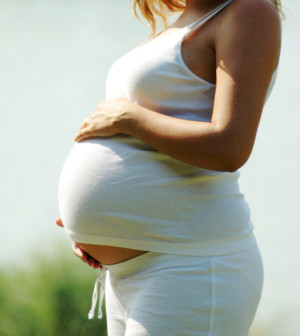- Could Your Grocery Store Meat Be Causing Recurring UTIs?
- Are You Making This Expensive Thermostat Error This Winter?
- Recognizing the Signs of Hypothyroidism
- 10 Strategies to Overcome Insomnia
- Could Artificial Sweeteners Be Aging the Brain Faster?
- Techniques for Soothing Your Nervous System
- Does the Water in Your House Smell Funny? Here’s Why
- Can a Daily Dose of Apple Cider Vinegar Actually Aid Weight Loss?
- 6 Health Beverages That Can Actually Spike Your Blood Sugar
- Treatment Options for Social Anxiety Disorder
Drinking Water Contaminant Linked to Pregnancy Complications in Study


A common drinking water contaminant increases the risk of some types of pregnancy complications, a new study suggests.
“Our results suggest that prenatal PCE exposure is not associated with all obstetric complications, but may increase the risk of certain ones, including stillbirth and placental abruption [when the placenta separates from the wall of the uterus],” the Boston University Medical Center researchers said in a university news release.
The team looked at the effects of the chemical tetrachloroethylene (PCE) among pregnant women in Cape Cod, Mass., where water was contaminated with PCE in the late 1960s to early 1980s due to vinyl-lined asbestos cement pipes.
The study included nearly 1,100 pregnancies among women with high exposure to PCE and about 1,000 pregnancies among women with no exposure to the chemical.
Pregnant women with high PCE exposure were more than twice as likely to have a stillbirth and 1.35 times more likely to have placental abruption than those who weren’t exposed to PCE. Those with high PCE exposure were also at increased risk for vaginal bleeding.
There was no link between PCE exposure and preeclampsia or smaller-than-normal infants, according to the study published recently in the journal Environmental Health.
The findings support previous research indicating that PCE exposure may affect placental function and fetal growth. But further research into other possible effects during pregnancy is needed, study author Ann Aschengrau, a professor of epidemiology at Boston University School of Public Health, said in the news release. The study only found a link between PCE and pregnancy complications but did not prove cause and effect.
“We need to have a better understanding of the impact of this common drinking water contaminant on all aspects of pregnancy,” she said.
More information
The U.S. Environmental Protection Agency has more about tetrachloroethylene in drinking water.
Source: HealthDay
Copyright © 2026 HealthDay. All rights reserved.










